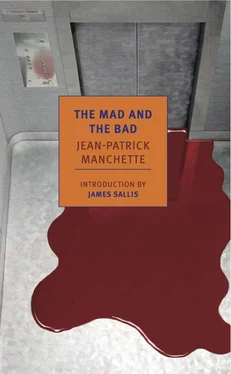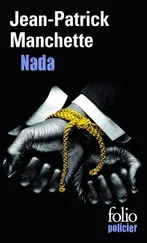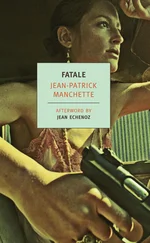Jean-Patrick Manchette - The Mad and the Bad
Здесь есть возможность читать онлайн «Jean-Patrick Manchette - The Mad and the Bad» весь текст электронной книги совершенно бесплатно (целиком полную версию без сокращений). В некоторых случаях можно слушать аудио, скачать через торрент в формате fb2 и присутствует краткое содержание. Год выпуска: 2014, ISBN: 2014, Издательство: New York Review Books, Жанр: Криминальный детектив, на английском языке. Описание произведения, (предисловие) а так же отзывы посетителей доступны на портале библиотеки ЛибКат.
- Название:The Mad and the Bad
- Автор:
- Издательство:New York Review Books
- Жанр:
- Год:2014
- ISBN:9781590177402
- Рейтинг книги:4 / 5. Голосов: 1
-
Избранное:Добавить в избранное
- Отзывы:
-
Ваша оценка:
- 80
- 1
- 2
- 3
- 4
- 5
The Mad and the Bad: краткое содержание, описание и аннотация
Предлагаем к чтению аннотацию, описание, краткое содержание или предисловие (зависит от того, что написал сам автор книги «The Mad and the Bad»). Если вы не нашли необходимую информацию о книге — напишите в комментариях, мы постараемся отыскать её.
The Mad and the Bad — читать онлайн бесплатно полную книгу (весь текст) целиком
Ниже представлен текст книги, разбитый по страницам. Система сохранения места последней прочитанной страницы, позволяет с удобством читать онлайн бесплатно книгу «The Mad and the Bad», без необходимости каждый раз заново искать на чём Вы остановились. Поставьте закладку, и сможете в любой момент перейти на страницу, на которой закончили чтение.
Интервал:
Закладка:
Doctor Rosenfeld came up to Hartog, his hand outstretched. The two were roughly the same height. Rosenfeld was beginning to go bald. He had a lively expression and wore a plaid tie and no vest.
“I’m delighted to see you,” he said.
“Is the girl ready?”
“Mademoiselle Ballanger is packing. She’ll be here in a moment. I’ll let her know right away.”
He went back behind his desk and fiddled with an intercom. They were in the corner tower that overlooked the water. A breath of damp air wafted through the open window. Hartog went over to the casement and looked out.
“Monsieur Hartog is here,” said Rosenfeld. “If mademoiselle could come right away with her suitcase-”
The intercom buzzed. Rosenfeld nodded and broke the connection. He arched back in his office chair and contemplated Hartog, who was looking down at the water with an irritated expression. The doctor hunted in drawers, extracted a straight-stemmed pipe and some Jean Bart tobacco, and began loading the pipe. A half smile hovered on his lips. Hartog turned round briskly and faced him.
“I’ll write you a check.”
The doctor raised his eyebrows.
“A gift,” said the redhead emphatically. “A gift for your institution.”
“Very well, if you wish. But it is not necessary.”
“What you do is interesting.”
“Anti-psychiatry, you mean?”
“I don’t know,” said Hartog. “I mean minding crazy people.”
Rosenfeld grimaced, almost spoke, but changed his mind and lit his pipe. Hartog leant on the corner of the desk and made out a check for ten thousand francs. When he had finished writing, he held the check out to the doctor.
“This is a lot of money,” said Rosenfeld.
“It’s nothing to me,” answered Hartog.
2
In the manor’s community room, an audience of inmates sat on benches. Taking advantage of the staff’s lack of attentiveness, the patients were passing around a bottle of Kiravi red wine and sipping it through a straw. On a stage, a dozen people were dancing about, singing and playing music enthusiastically. They had drums, an upright piano, a cornet, and a tenor saxophone.
“Oh, the thrill, the fearsome thrill of the first embrace!” went the singers.
Several spectators were clapping incessantly.
In Julie’s bedroom the sounds of the concert were distantly audible, but the words were unintelligible.
The room was roughly cubiform, with pale green walls, a table, a chair, blinds, and a reproduction of a van Gogh painting of a wheat field. Julie was standing next to her luggage, a cardboard suitcase and a skai bag. She was a thin, tall girl with hollow cheeks and luxuriant black- very black-hair. She had a porcelain complexion and brightly colored lips. She was beautiful, but in a startling way: she might have been taken for a transvestite. Her tweed suit was too warm for the season. Large tan hands protruded from her sleeves like bunches of beans hung up to dry.
A nurse with a benevolent horsey face came in.
“He is here,” she announced.
“Already?”
“Why, aren’t you happy about it?”
“I’m scared.”
“Come on, sweetheart. Don’t you worry. He’s supposed to be a nice man.”
“Hmmm,” said Julie.
The nurse picked up the suitcase and left the room. Julie picked up the skai bag and followed. The two women went outside and made for the corner tower. It was a fine day. It was spring. As they passed in front of the manor Julie looked at the Lincoln. The driver was reading the sports paper L’Équipe. He had put on tinted glasses. He returned Julie’s gaze.
The two women entered the tower by a small side door. A few meters down a hallway they came to the white leather padding, the bell, and the intercom.
“Come in, come in.”
Once in the office, Julie contemplated the redhead and was taken aback by his youthful, modish appearance. Rosenfeld had risen to his feet, his pipe clamped in his mouth, less jovial than usual.
“Michel Hartog, Julie Ballanger,” he said by way of introduction.
Hartog scrutinized Julie.
“I suggest we talk as we drive. Let’s go.”
“What? Already?”
“You might like to take a little stroll around the grounds,” Rosenfeld put in. “A chance to get acquainted. Julie is naturally overwhelmed by the idea of leaving us forever after living here for five years. In her shoes, I am sure you would be a little panicked.”
“Sure, it would be perfectly awful for me,” said Hartog. He turned to Julie. “Come on, let’s go.”
“I could have refreshments brought out for you by the pond,” Rosenfeld persisted, his voice trailing off.
Hartog did not deign to respond. Grabbing hold of Julie’s suitcase, he held his hand out to the doctor. The doctor shook it weakly.
“Julie,” began Rosenfeld, “I hardly need tell you- “
“Quite so,” said Hartog rudely.
He grasped the young woman by the elbow and towed her towards the door.
3
As the Lincoln started off, Julie, in the back seat, turned round. Through the rear window she saw her analyst and the nurse, Madame Cécile, holding a Kleenex, both waving goodbye. The two figures grew smaller. The tires sang on the gravel. Then the Lincoln was back on the asphalt of the road, the manor lurched and disappeared, the car picked up speed, and the trees and rotting leaves raced by.
Julie admired the automobile. It was like being in a boat. Genuine leather and mahogany adorned the interior. There were all kinds of recessed features behind the front seats. Julie ran her hand over the controls set into the leather.
“Look at this,” said Hartog.
He opened the alcoves one by one, showing Julie a bar, a radio-telephone, a tiny television, and a miniature steno keyboard.
“It’s not a magic car,” said Hartog. “It was made by people, you know.”
“It’s impressive all the same. I’m just a poor girl, aren’t I?”
Julie tinkered with the electric latches. Her manipulation opened another compartment. Within it was a revolver, which she took to be a Colt. In fact it was a short-barreled Arminius, a German weapon. The sides of the grip were plastic, and it looked like a toy. Julie quickly closed the compartment. Hartog laughed.
“It’s just for protection. Sorry, but I’m not a crime lord!”
“No, you’re a soap lord!”
They both laughed.
“You didn’t picture me like this, did you?”
“I certainly didn’t. I imagined a polite old gentleman.”
“That’s because of my reputation for doing good. Everyone thinks I’m gaga. Would you like a drink?”
“I’m not allowed it.”
“My ass you’re not!” cried Hartog, and Julie’s eyebrows danced up and down.
The young man opened the minibar and fixed two Ballantine’s on the rocks. He put one of them in Julie’s hand.
“Dédé!” he called. “How about a drink?”
“Sure thing,” replied the driver.
Hartog passed him a whiskey, which the thickset man emptied as he drove. The Lincoln got onto the Autoroute de l’Ouest and immediately picked up speed. It hit 140 kph and stayed there, eating up the fast lane. The passengers were as snug as if they were in a railroad sleeping car.
“What do you think of me?” Hartog asked. “What do you know about me? Do you get the feeling you are in a fairy tale?”
“I don’t believe in fairy tales.”
“Okay. But what then?”
“You are a soap, oil, and detergent magnate. You are rich and you are a philanthropist.”
“Let’s not exaggerate.”
“You do Good. You are probably trying to compensate for the feeling of being a usurper. Because your wealth is not the fruit of your own labor. Only the death of your brother and his wife made you the owner of it. You must have developed a strong sense of guilt, even if you had no wish for them to die. Anyway, one always wishes for the death of one’s brother at some level.”
Читать дальшеИнтервал:
Закладка:
Похожие книги на «The Mad and the Bad»
Представляем Вашему вниманию похожие книги на «The Mad and the Bad» списком для выбора. Мы отобрали схожую по названию и смыслу литературу в надежде предоставить читателям больше вариантов отыскать новые, интересные, ещё непрочитанные произведения.
Обсуждение, отзывы о книге «The Mad and the Bad» и просто собственные мнения читателей. Оставьте ваши комментарии, напишите, что Вы думаете о произведении, его смысле или главных героях. Укажите что конкретно понравилось, а что нет, и почему Вы так считаете.












